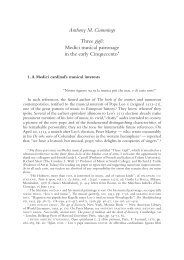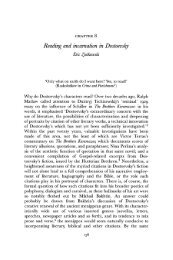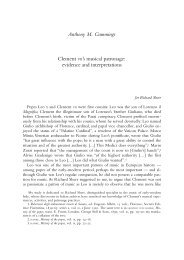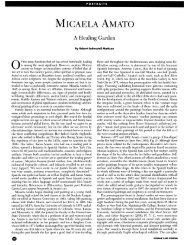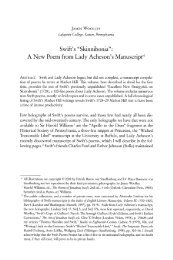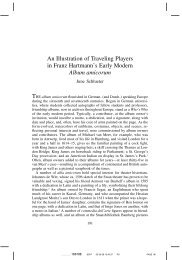courses of instruction - Lafayette College
courses of instruction - Lafayette College
courses of instruction - Lafayette College
You also want an ePaper? Increase the reach of your titles
YUMPU automatically turns print PDFs into web optimized ePapers that Google loves.
lengthen the active service obligation unless<br />
the degree is obtained at military expense.<br />
Career Opportunities. Individuals are<br />
commissioned as <strong>of</strong>ficers in the United<br />
States Army after completion <strong>of</strong> the ROTC<br />
program, advanced camp, and a bachelor's<br />
degree. They then qualify in branches (spe<br />
cialties) such as the Corps <strong>of</strong> Engineers, Avi<br />
ation, Armor, Infantry, Field Artillery, Air<br />
Defense Artillery, Signal Corps, Military In<br />
telligence, Military Police, Chemical Corps,<br />
Ordnance Corps, Finance, Transportation,<br />
Adjutant General, Quartermaster, Medical<br />
Service Corps, or Nursing Corps. Officers<br />
work as leaders/managers, specialists, or<br />
combinations <strong>of</strong> the two depending on the<br />
assignment.<br />
There are many opportunities for ad<br />
vanced military and civilian schooling be<br />
ginning with nearly three months <strong>of</strong> train<br />
ing in the branch specialty. A person may<br />
later receive additional training in a special<br />
ty area such as: Information Systems Engi<br />
neering, Information Operations, Strategic<br />
Intelligence, Psychological Operations,<br />
Space Operations, Human Resource Man<br />
agement, Comptroller, Public Affairs, For<br />
eign Area Specialization, Operations Re<br />
search/Systems Analysis, Nuclear Opera<br />
tions and Research, Information Systems<br />
Management, Simulations Operations, or<br />
Strategic Plans and Policy.<br />
Students selected for reserve forces duty<br />
become <strong>of</strong>ficers in the Army Reserve or<br />
Army National Guard in their hometown<br />
area and essentially have a part-time mili<br />
tary career. Active duty <strong>of</strong>ficers are assigned<br />
at various locations throughout the world.<br />
An <strong>of</strong>ficer can earn retirement through both<br />
programs after 20 years <strong>of</strong> service.<br />
Course Credit Credits earned in MS 101,<br />
102, 201, 202,303, and 304 are recorded on<br />
the transcript and count toward the GPA,<br />
but may not be used to fulfill the minimum<br />
course requirement for graduation. MS 401<br />
and 402 may be used to fulfill two course<br />
credits toward the 32 course requirement<br />
for graduation in A.B. and B.S. science pro<br />
grams. In the case <strong>of</strong> B.S. engineering<br />
programs, MS 304 and 401 may be used to<br />
fulfill two free electives and MS 402 to sat<br />
MILITARY SCIENCE<br />
isfy one <strong>of</strong> the required Humanities/So<br />
cial Science electives.<br />
Leadership Laboratory. For all MS cours<br />
es, a Leadership Laboratory is scheduled.<br />
The lab provides students the opportunity<br />
to demonstrate an understanding <strong>of</strong> the<br />
leadership process and develop funda<br />
mental military skills. Lab dates and<br />
times are included in the course syllabus.<br />
During labs, <strong>instruction</strong> on a variety <strong>of</strong><br />
subjects with military application pro<br />
vides the context within which students<br />
have opportunities to both teach and lead<br />
in a group setting. Responsibility is ex<br />
panded as the student progresses through<br />
the military science program. In the se<br />
nior year, students assume responsibility<br />
for the planning, preparation, and conduct<br />
<strong>of</strong> the laboratory. Leadership Laboratory<br />
is mandatory for all students enrolled in<br />
military science <strong>courses</strong>.<br />
101. Introduction to Military Science.<br />
The American Army as an institution; its<br />
roots, history, customs, traditions, and<br />
philosophy <strong>of</strong> leadership. Emphasizes the<br />
development and role <strong>of</strong> the pr<strong>of</strong>essional<br />
<strong>of</strong>ficer corps. Includes Leadership Labo<br />
ratory and Field Training Exercise (FTX).<br />
One course credit with completion <strong>of</strong> both<br />
MS 101 and 102. Offered in fall semester.<br />
102. Leadership Assessment and Group<br />
Dynamics. Role <strong>of</strong> the individual and the<br />
leader within the group, leadership skills<br />
and characteristics. Emphasis on problem-<br />
solving and practical applications. Includes<br />
Leadership Laboratory and FTX. One course<br />
credit with completion <strong>of</strong> both MS 101 and<br />
102. Offered in spring semester.<br />
201. Leadership Theory and Manage<br />
ment. Contemporary theories, traits, prin<br />
ciples, and small unit tactics development.<br />
Emphasizes leadership philosophies, com<br />
munications, leader-follower relation<br />
ships, and leadership problem-solving.<br />
Leadership simulations. Includes Leader<br />
ship Laboratory and FTX. One course<br />
credit. Offered in fall semester.<br />
147




